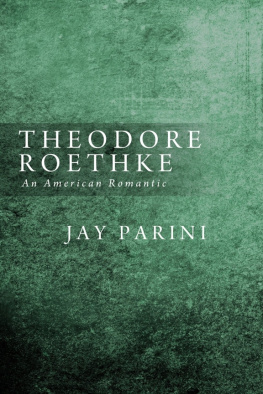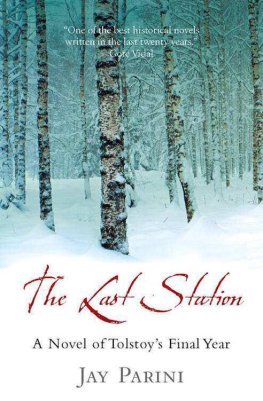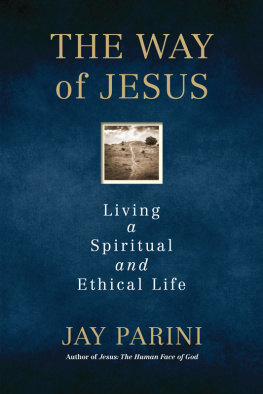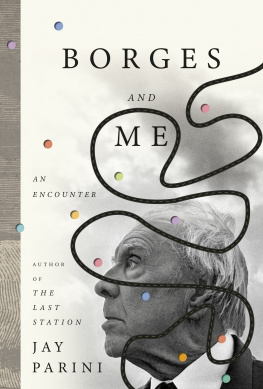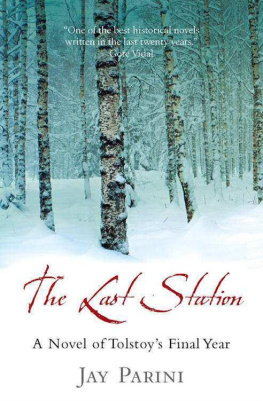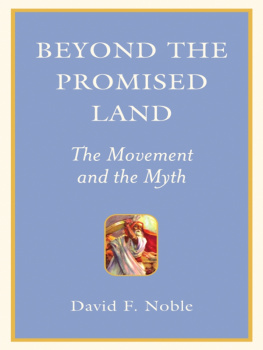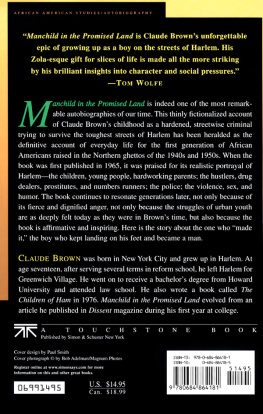Jay Parini - Promised Land: Thirteen Books That Changed America
Here you can read online Jay Parini - Promised Land: Thirteen Books That Changed America full text of the book (entire story) in english for free. Download pdf and epub, get meaning, cover and reviews about this ebook. year: 2008, publisher: Anchor, genre: Religion. Description of the work, (preface) as well as reviews are available. Best literature library LitArk.com created for fans of good reading and offers a wide selection of genres:
Romance novel
Science fiction
Adventure
Detective
Science
History
Home and family
Prose
Art
Politics
Computer
Non-fiction
Religion
Business
Children
Humor
Choose a favorite category and find really read worthwhile books. Enjoy immersion in the world of imagination, feel the emotions of the characters or learn something new for yourself, make an fascinating discovery.

- Book:Promised Land: Thirteen Books That Changed America
- Author:
- Publisher:Anchor
- Genre:
- Year:2008
- Rating:4 / 5
- Favourites:Add to favourites
- Your mark:
- 80
- 1
- 2
- 3
- 4
- 5
Promised Land: Thirteen Books That Changed America: summary, description and annotation
We offer to read an annotation, description, summary or preface (depends on what the author of the book "Promised Land: Thirteen Books That Changed America" wrote himself). If you haven't found the necessary information about the book — write in the comments, we will try to find it.
Promised Land: Thirteen Books That Changed America — read online for free the complete book (whole text) full work
Below is the text of the book, divided by pages. System saving the place of the last page read, allows you to conveniently read the book "Promised Land: Thirteen Books That Changed America" online for free, without having to search again every time where you left off. Put a bookmark, and you can go to the page where you finished reading at any time.
Font size:
Interval:
Bookmark:
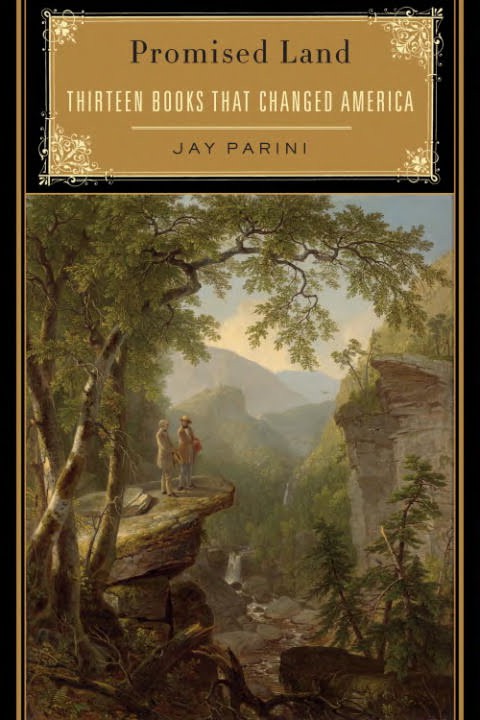
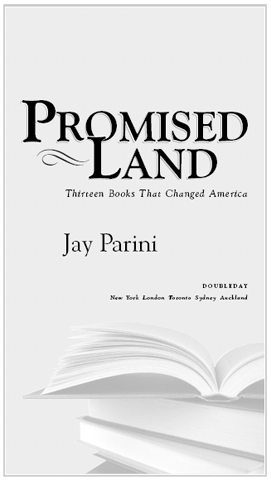
CONTENTS
FOR DEVON
a promise kept
And Moses went up from the plains of Moab to Mount Nebo, to the top of Pisgah, which is opposite Jericho. And the Lord showed him all the land, Gilead as far as Dan, all Naphtali, the land of Ephraim and Manasseh, all the land of Judah as far as the Western Sea, the Negeb, and the Plain, that is, the valley of Jericho the city of palm trees, as far as Zoar. And the Lord said to him, This is the land of which I swore to Abraham, to Isaac, and to Jacob, I will give it to your descendants. I have let you see it with your eyes, but you shall not go over there.
DEUTERONOMY 34:14
ACKNOWLEDGMENTS
I am grateful to so many people who have helped me write and edit this book and who have shaped my thinking on these various books. Let me mention only the most obvious ones. Thanks to my editor, Gerald Howard, first of all. His encouragement and advice, as well as his firm editorial guidance, have been invaluable. Im grateful to Geri Thoma, my agent, for her endless patience, cheerleading, and editorial advice. A few friends were especially helpful in reading over parts or, in some cases, the whole of this book, making countless suggestions for revisions. Among these were Charles Baker, David Bain, John Elder, Murray Dry, and James Ralph. I cant thank them enough. Finally, I must thank my wife, Devon Jersild, whose intellectual and moral standards keep me on my toes as reader and writer.
INTRODUCTION
O N A BALMY NIGHT in north London a few summers ago, I attended a lecture by Lord Melvyn Bragg, the well-known British journalist. It was called Twelve Books That Changed the World, based on a recent book of his. He chose twelve English books, of course, including Newtons Principia Mathematica (1687), Adam Smiths Wealth of Nations (1776), and Darwins On the Origin of Species (1859). Provoked by the lecture, I began to think about what twelve books had changed America in important ways, jotting down titles in the margins of my program. The list expanded wildly as I decided to write a study along similar lines, based on major American texts. I found myself obsessing over my choices and lay awake for weeks, adding and subtracting works.
This was never meant to be a list of the greatest American books: not The Scarlet Letter, The Great Gatsby, or The Education of Henry Adams. Although I love poetry, I knew that not even Walt Whitman and Robert Frost, let alone Wallace Stevens or Elizabeth Bishop, had noticeably changed America in any significant way (except among that tiny group who actually read poetry). I was looking for books that played a role in shaping the nations idea of itself or that consolidated and defined a major trend. Ideally, I wanted books that shifted consciousness in some public fashion, however subtly, or opened fresh possibilities for the ways Americans lived their lives. Well over a hundred books came to mind. (See my appendix, where I list and comment briefly on one hundred more books that changed America.) The list could easily have expanded, if one allowed for important works of history and biography, or works that affected a particular academic field in important ways. (In the sciences, one more often hears of papers that changed the field, rather than books per se.)
In the end, I settled on Of Plymouth Plantation, The Federalist Papers, The Autobiography of Benjamin Franklin, The Journals of Lewis and Clark, Walden, Uncle Toms Cabin, Adventures of Huckleberry Finn, The Souls of Black Folk, The Promised Land, How to Win Friends and Influence People, The Common Sense Book of Baby and Child Care, On the Road, and The Feminine Mystique. Of these, only Walden, Huckleberry Finn, and On the Road could be considered great books as such. But each of them changed America in some visible and profound way.
By books that changed America, I mean works that helped to create the intellectual and emotional contours of this country. Each played a pivotal role in developing a complex value system that flourishes to this day. I expanded my list of works under discussion in Promised Land from twelve to thirteen, preferring the odd number, a bakers dozen, as it reflects the irregular nature of my project and distantly echoes the number of original colonies. I might easily have discussed fifteen or twenty books, but one has to stop somewhere, and I wanted to reflect certain major strains in American thought or culture without seeming encyclopedic.
Soon I realized that each of the books under view was not a single work but a whole climate of opinion (to adapt a phrase from W. H. Auden), a watershed of sorts. Dozens of ancillary books circled the one under observation, some anticipating it, others commenting on, refuting, or reacting to the work. The book itself often represented a strong reaction to trends already in place, or offered ways of circumventing or countermanding a tradition. Originality is always rare, and usually mistaken for something else, such as eccentricity or confusion. Often it simply marks a fresh approach to ideas or themes previously in motion. In choosing a single work to discuss, I understood I was taking on a field of inquiry, a tradition, a vein of significant thought. This was intimidatingbut exhilarating, too. I would have to dig around the work under examination, sift the soil it grew in, pull out its roots and examine them carefully. I would have to scan the field to see where the seeds had blown, taken hold, and blossomed.
In discussing these thirteen books, I frequently refer to the works and ideas that swirl around them. Walden, for example, is a book that both creates and participates in the broad traditions of nature writing and memoir. It was dependent on Emersons Nature (1836), for example, as a prior work in a more abstract mode, one that underlies Walden in fascinating ways, forming a kind of intellectual template. In discussing Walden, I also talk about the roots of transcendentalism in European (especially German) Romanticism. I look at American nature writing in general, too, identifying Thoreaus part in this tradition, looking forward as well as backward. And so Annie Dillards wonderful Pilgrim at Tinker Creek (1974) represents a distant, further ripple of the stone tossed into Walden Pond.
A key aspect of Promised Landas the title itself suggestslies in its exploration of national myths. Of Plymouth Plantation, for instance, was a mythmaking book. Part history and part memoir, it was written by William Bradford, of the Plymouth Colony. He and his fellow Pilgrims arrived on the Mayflower in 1620, surviving a difficult first year with help from the local Indians. The Pokanoket tribe, led by a sympathetic chief called Massasoit, provided crucial survival skills as well as much-needed supplies to the white settlers. Massasoit and Bradford (who became governor of the colony) forged a truce that lasted for half a centuryuntil chaos broke out with King Philips War. If it were not for this major work by Bradford, the full story of the Mayflower crossing, the establishment of a colonial beachhead, and the beneficent role played by the Indians would have been lost. The manuscript disappeared for over two centuries and was rediscovered by an American tourist in London. Published in 1856, it became a national sensation. Americans found themselves staring, through the prism of this text, into their own complex and beautiful origins. Abraham Lincoln seized on the story, decidingin 1863, in the depths of the Civil Warthat Thanksgiving should become a national holiday, with its myth of survival through cooperation and mutual respect for those with different cultural and racial origins.
Next pageFont size:
Interval:
Bookmark:
Similar books «Promised Land: Thirteen Books That Changed America»
Look at similar books to Promised Land: Thirteen Books That Changed America. We have selected literature similar in name and meaning in the hope of providing readers with more options to find new, interesting, not yet read works.
Discussion, reviews of the book Promised Land: Thirteen Books That Changed America and just readers' own opinions. Leave your comments, write what you think about the work, its meaning or the main characters. Specify what exactly you liked and what you didn't like, and why you think so.

